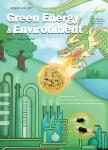Two-dimensional metallic tantalum ditelluride with an intrinsic basal-plane activity for oxygen reduction:A microkinetic modeling study
Two-dimensional metallic tantalum ditelluride with an intrinsic basal-plane activity for oxygen reduction: A microkinetic modeling study作者机构:Environmental Process Modelling CentreNanyang Environment and Water Research InstituteNanyang Technological University1 CleanTech Loop637141Singapore School of Mechanical and Aerospace EngineeringNanyang Technological University50 Nanyang Avenue639798Singapore
出 版 物:《Green Energy & Environment》 (绿色能源与环境(英文版))
年 卷 期:2022年第7卷第3期
页 面:525-532页
核心收录:
学科分类:0808[工学-电气工程] 081705[工学-工业催化] 08[工学] 0817[工学-化学工程与技术]
基 金:financial support from the Nanyang Environment and Water Research Institute (Core Fund) Nanyang Technological University Singapore
摘 要:Two-dimensional(2D) materials have exhibited great potential for replacing costly Pt for oxygen reduction reaction(ORR) because of their distinctive structural features and high pre-site ***,their performance is generally hindered by the limited density of active sites(e.g.,at the layer edges).Although they feature a high exposure of surface sites,these sites are typically inert for ***,through density functional theory calculations,we propose a promising ORR catalyst candidate,a 2D TaTe_(2) nanosheet,which has an intrinsic high basal-plane *** of the thermodynamic and kinetic processes are explored,which demonstrates that the basal-plane Te sites of the TaTe_(2) nanosheet have great potential for facilitating ***,we construct a microkinetic model of ORR proceeding on TaTe_(2),which unveils its dynamic intermediate coverage under different electrode potentials and identifies the dominating associative *** theoretical half-wave potential of TaTe_(2) is predicted to be 0.87 V,which exceeds those of the well-established Pt(111) and Fe–N–C single-atom catalysts computed at the same *** study not only presents the first 2D,non-Pt ORR catalyst candidate with an intrinsic basal-plane activity but also offers a rational methodology for unveiling the mechanism/activity of ORR and other electrochemical reactions.



